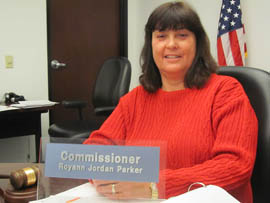
Royann Jordan Parker, chairwoman of the Arizona Citizens Clean Elections Commission, says no rule can cover every possible way a candidate can use public funding. On Thursday, she and other commissioners put off voting on a proposed rule change that would require candidates to return or buy back laptops, printers, cameras and other fixed assets that cost $200 or more. (Cronkite News Service Photo by Alyssa Newcomb)
The Arizona Citizens Clean Elections Commission on Thursday put off voting on a proposed rule change that would require publicly financed candidates to return or purchase fixed assets such as laptops, printers and cameras.
The original rule change would have made Clean Elections candidates turn over all fixed-asset purchases exceeding $200 to state surplus within seven days of the election’s end or buy them with their personal funds for 75 percent of the purchase price.
At Thursday’s meeting, Jeff Fairman, a commissioner who will be the chairman next year, suggested the rule be changed to allow candidates up to 30 days after an election to return fixed assets and provide the option of buying them for 50 percent of the purchase price.
“They’re getting a great computer for a reasonable price. I think more people would take that option,” he said.
He added it would reduce the amount items state surplus would have to take back.
The proposed rule, with its suggested changes, will be available for public comment for another 60 days before the commission takes action at its Jan. 27 meeting.
Cronkite News Service reported last month that some of the 107 legislative candidates who opted for Clean Elections funding purchased laptops and other fixed assets, paid relatives to do campaign work and provided entertainment such as a mariachi band and a “post-debate discussion” with campaign staffers at T.G.I. Friday’s.
Current rules allow purchases of fixed assets worth up to $800 provided that candidates disclose them.
Todd Lang, executive director of the Citizens Clean Elections Commission said such purchases are an issue that has come up several times over the years.
“To be fair, the expenditures in question are often the same expenditures traditional campaigns make,” he said.
“If you’re running a serious campaign these days, you need a computer. You need a printer. You need a cell phone and a camera,” he added.
But Lori Daniels, one of the five commissioners, said “there is a distinction because it is taxpayer dollars.”
Daniels later clarified for the record that the money comes from fines paid by taxpayers, not from general tax revenues.
In an interview after the meeting, Royann Jordan Parker, chairwoman of the commission, it’s impossible to write a rule that will cover every possibility in campaign.
“Campaigning is a subjective industry, in a sense,” she said.
Proposed rule changes:
Original: Candidates would have to return fixed assets worth more than $200 to state surplus within seven days or buy them for 75 percent of the purchase price.
Amended: Candidates would have to return fixed assets worth more than $200 to state surplus within 30 days or buy them for 50 percent of the purchase price.
 Arizona Capitol Times Election Coverage Your Inside Track to Arizona Elections
Arizona Capitol Times Election Coverage Your Inside Track to Arizona Elections
5 comments
Pingback: Twitter Trackbacks for Arizona Capitol Times » Blog Archive » Clean Elections Commission puts off vote on fixed-assets rule change [azcapitoltimes.com] on Topsy.com
Pingback: Clean Elections Commission puts off vote on fixed-assets rule change – Arizona Capitol Times by Term Life Insurance Costs
Pingback: Clean Elections Commission puts off vote on fixed-assets rule change – Arizona Capitol Times « Cheap Life Insurance Costs
Pingback: Clean Elections Commission puts off vote on fixed-assets rule change – Arizona Capitol Times « Furniture Store USA
Pingback: Clean Elections Commission puts off vote on fixed-assets rule change – Arizona Capitol Times by Consolidating College Loans Personal